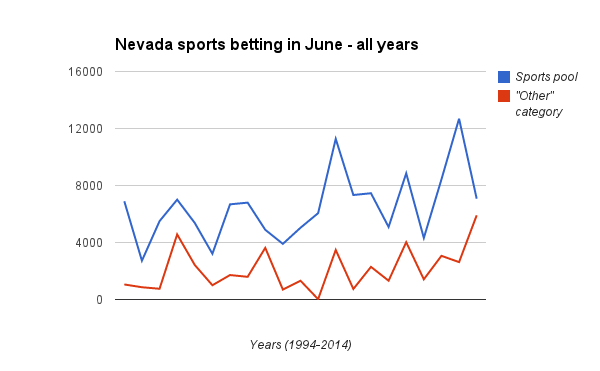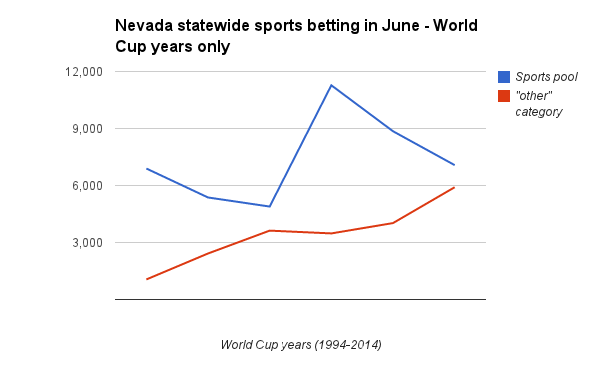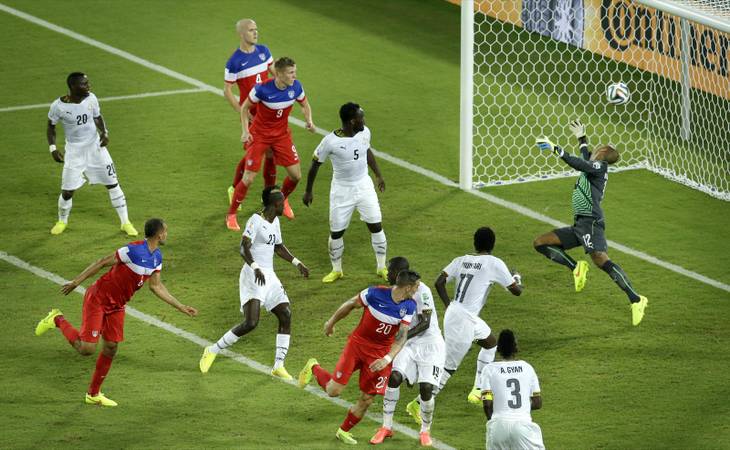In another sign that the American public is embracing soccer more than ever, the Nevada gaming industry appears to have cashed in on this year's World Cup at a record level.
It's difficult to say with certainty that betting on soccer hit a record this year, because the Nevada Gaming Control Board doesn't break down revenue for the sport specifically, but the category that includes soccer was up. That category is labeled "other" and includes such sports as boxing and auto racing.
But data from 1994 through last month show that “other” revenue in June is usually higher during years when the World Cup is held. And it’s grown tremendously.
In June 1994, when the United States hosted the tournament, Nevada reported $1.05 million in “other” sports betting revenue. Last month, that figure was $5.9 million — the highest “other” June since 1997, when heavyweight boxer Mike Tyson was disqualified for biting off a piece of Evander Holyfield's ear during an infamous fight in Las Vegas.

Veteran oddsmaker Jimmy Vaccaro of the South Point said the World Cup, which takes place every four years in June and July, comes at an opportune time of year, providing a welcome boost for the books when there isn’t a lot of other action from major sports.
“It was a great little thing to have during what we call our ‘down days of summer,’” Vaccaro said.
Nationwide, this was a banner year for World Cup viewership in America. The final match in July between Germany and Argentina was viewed by more than 26 million people, making it the most watched soccer match in U.S. history.
Wagering on the World Cup was also likely fueled by the fact that the tournament was held in a time zone that allowed the games to be televised in the U.S. during the day. When South Africa held the World Cup in 2010, the nine-hour time difference meant some games started at 4 a.m. Nevada time.
In Brazil, the tournament’s host country this year, matches started at much more convenient hours, many at noon or 3 p.m. Nevada time.
Because of the growth of televised games and their availability on the Internet, fans today also have a lot more options when it comes to viewing specific games than they did in 1994.
“It has expanded the base of people that are interested in sports,” said Frank Streshley, chief of the tax and license division at the gaming control board. “(Fans) can wager on a game and go watch it, whereas maybe a decade ago or 15 years ago, not all your games were televised.”
The United States team's performance also helped generate interest. The U.S. team advanced through several close matches to the Round of 16, where it was eliminated by Belgium on July 1.
Put all these factors together, and the conditions were ripe for the most intense wagering on the World Cup the state has ever seen.
“The betting was great — it was great from start to finish,” said Nick Bogdanovich of William Hill. “It was way more than we could ever expect.”
Yet betting on the World Cup still pales in comparison to the revenue brought in by the state from the three major sports, and it’s unlikely to catch up anytime soon — if ever. In February, when the most recent Super Bowl was held, Nevada recorded $18.6 million in revenue from football wagering alone.
Nonetheless, Vaccaro said he expects World Cup betting to continue trending upward over time.
“It’s not going to go crazy now, but I believe we’ll see a steady increase,” he said.

